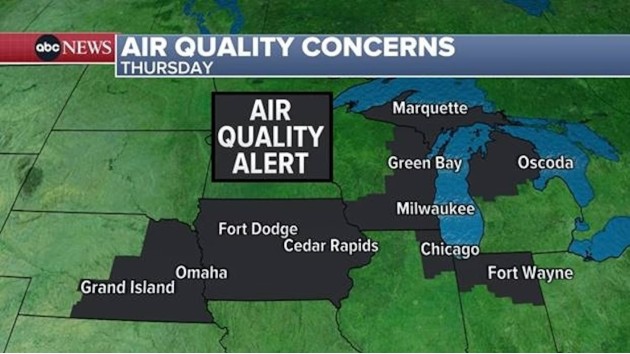(NEW YORK) — Smoke from raging wildfires in Canada continues to bring potentially dangerous air quality conditions to parts of the northern United States, with hazy skies in the East.
As of Thursday, there are 200 active wildfires burning in Canada, with 103 of these considered to be “out of control,” meaning fires that are being observed and assessed, but not immediately suppressed, according to the Canadian Interagency Forest Fire Centre.
The smoke from the flames will create potentially dangerous air quality conditions from Nebraska to Michigan on Thursday, including the cities of Chicago; Milwaukee; Omaha, Nebraska; and Green Bay, Wisconsin. Among the major cities in the world, Chicago has the second-worst air quality on Thursday.
While the general public will not be impacted, sensitive groups — those who have asthma, are pregnant and the elderly — may be at risk and should avoid time outdoors while these alerts are in place.
Haze over the Northeast and the Mid-Atlantic will be visible on Thursday and Friday, but will only be visible when there is a break in the clouds due to incoming showers. A “milky” sky is expected through the end of the week in these areas, especially in the Northeast.
As of Thursday, the areas of Canada with the most fires include British Columbia with 67 and Alberta with 50, according to the CIFFC.
Last week, the provinces of Saskatchewan and Manitoba declared state of emergencies due to the fires, with around 17,000 residents already evacuated, according to The Associated Press.
The combination of dry conditions and “little-to-no precipitation” will continue to feed the flames and make it difficult for officials to manage the fires, Saskatchewan Public Safety said on Sunday.
In regard to the ferocity and speed of these fires, Saskatchewan Premier Scott Moe said on Wednesday he had “never seen anything like it.”
Moe said these flames are “encroaching” on communities, with several buildings in the town of La Ronge burning down on Tuesday and Wednesday.
During a press conference on Monday, Saskatchewan Public Safety discouraged any nonessential travel due to the significant fire activity.
Aircraft and dozens of personnel from other Canadian provinces and the United States — including Arizona, Oregon and Alaska — are being sent to help fight the wildfires, Moe said.
Moe said last week there has been a “significant lack of moisture” in the northern parts of the province, causing “over 200 wildfires” in Saskatchewan this spring.
Copyright © 2025, ABC Audio. All rights reserved.





